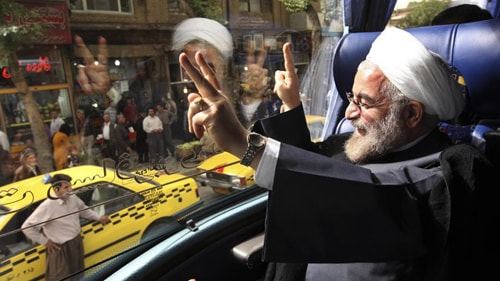Iran sanctions
The US House of Representatives' passing of a bill to cut Iranian oil imports is believed to be aimed at "threatening" the country's new President.
Over the past day, the world witnessed the next step of the US to increase sanctions against Iran. Determined to block all export routes of Iran, the US House of Representatives has just passed a bill to cut oil imports from Iran by 1 million barrels/day within 1 year. Although the bill still needs to be passed by the US Senate and signed by US President Barack Obama to become official law, this US sanction has further escalated the confrontation between the US and the Islamic country.
The US House of Representatives appears to have reached a high consensus in increasing pressure on Iran, with 400 out of 420 House members voting in favor of a bill to limit oil imports from Iran. In addition to cutting 1 million barrels of oil imports from Iran per day, the bill also blacklists a series of businesses in Iran's construction and oil exploitation sectors.
 |
Iran's President-elect, Rowhani (photo: USnews) |
It can be said that public opinion is not unfamiliar with the US sanctions against Iran with the aim of pressuring Iran to abandon its controversial nuclear program. However, the bill just passed by the US House of Representatives has attracted much attention from the world because it appeared just a few days before the inauguration of the new Iranian President, Hassan Rowhani, scheduled to take place on August 4.
Observers believe that perhaps the US wants to "show off" to Iran's new leader, despite the fact that this is a figure who is considered to have a more moderate view on the nuclear issue than outgoing President Ahmadinejad.
Iran has recently expressed its willingness to “extend an olive branch” to the US and the West. Iran’s official state news agency, IRNA, said that the country hopes to meet again in September with the P5+1 group (the five permanent members of the United Nations Security Council: the US, UK, France, Russia, China and Germany) to continue discussing a solution to Iran’s controversial nuclear program. However, the new US sanctions will certainly “throw cold water” on these efforts by Iran.
What the public is concerned about is how far the recent developments will push tensions between Iran and the US, as well as how they will impact the negotiation process on Iran's nuclear issue. It can be said that the relationship between the US and Iran is at its worst ever, especially after a year of the US tightening sanctions on the oil sector - the main source of income for the Iranian economy.
Not only tightening the domestic market, the US has also persuaded and even forced many countries, including US allies, to stop trading oil with Iran through expanded sanctions. The US House of Representatives has not hesitated to declare that the US goal is to “block” all Iranian oil exports worldwide by 2015.
However, reality has shown that the US and its allies have pushed Iran into a corner, only making the opportunity for negotiations more distant, but cannot change Iran's determination to possess nuclear weapons. Even when moderate leader Rowhani officially takes power, it will be the same. Mr. Rowhani once affirmed: "moderate foreign policy does not mean surrender but constructive and effective interaction with the world."
Although US sanctions are causing difficulties for Iran, it seems that they are not enough to “suffocate” the economy of this oil-rich country. Iran also has other strong partners such as Russia, China and new trading partners in Latin America. In just the past few years, Iran has signed more than 500 economic, trade and diplomatic agreements with South American countries. Therefore, the US-Iran confrontation will continue and it will be difficult to get concessions./.
According to VOV - DT






